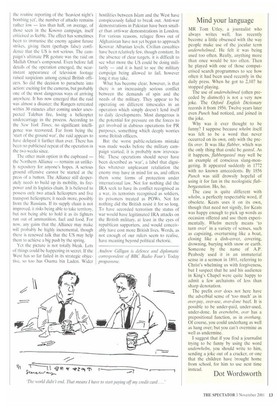Mind Mind your language
MR Torn Utley, a journalist who always writes well, has recently become a little obsessed with the way people make use of the jocular term underwhelmed. He felt it was being used too often. Really, anything more than once would be too often. Then he played with one of those computerised search programmes to see how often it had been used recently in the daily press. When he got to 2,107 he stopped playing.
The use of underwhelmed (often preceded by distinctly) is not a very new joke. The Oxford English Dictionary records it from 1956. Twelve years later even Punch had noticed, and joined in the joke.
Why was it ever thought to be funny? I suppose because whelm itself was felt to be a word that never occurred on its own, only with the prefix over. It was like flabber, which was the only thing that could be gasted. As it happens, flabbergasted may well be an example of conscious slang-mongering. It appeared suddenly in 1772 with no known antecedents. By 1856 Punch was still drowsily hopeful of using it for fun in the neologistic flabbergastation. Ho, ho.
The case is quite different with whelm, a perfectly respectable word, if obsolete. Keats uses it on its own, though that need not signify, for Keats was happy enough to pick up words as occasion offered and use them experimentally. Whelm merely means `to turn over' in a variety of senses, such as capsizing, overturning like a boat, closing like a dish-cover, covering, drowning, burying with snow or earth. Someone by the name of A.P. Peabody used it in an immaterial sense in a sermon in 1891, referring to Christ's whelming us with forgiveness, but I suspect that he and his audience in King's Chapel were quite happy to admit a few archaisms of less than sharp denotation.
The prefix over does not here have the adverbial sense of 'too much' as in over-pay, over-use, over-done beef. It is possible to be under-paid, under-used, under-done. In overwhelm, over has a prepositional function, as in overhang. Of course, you could underhang as well as hang over; but you can't overmine as well as undermine.
I suggest that if you find a journalist trying to be funny by using the word underwhelm, you should write to him, sending a joke out of a cracker, or one that the children have brought home from school, for him to use next time
instead. Dot Wordsworth


















































































 Previous page
Previous page